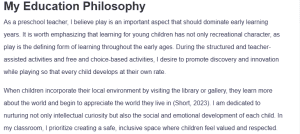My Education Philosophy
As a preschool teacher, I believe play is an important aspect that should dominate early learning years. It is worth emphasizing that learning for young children has not only recreational character, as play is the defining form of learning throughout the early ages. During the structured and teacher-assisted activities and free and choice-based activities, I desire to promote discovery and innovation while playing so that every child develops at their own rate.
When children incorporate their local environment by visiting the library or gallery, they learn more about the world and begin to appreciate the world they live in (Short, 2023). I am dedicated to nurturing not only intellectual curiosity but also the social and emotional development of each child. In my classroom, I prioritize creating a safe, inclusive space where children feel valued and respected. By encouraging empathy, cooperation, and self-expression, I help them develop essential social skills that will benefit them beyond preschool. I believe that early childhood is a critical time to build confidence and a positive self-image, empowering each child to embrace challenges and celebrate their unique strengths.
Furthermore, parent and caregiver relationships with children and families are important to an effective early childhood education program (Jeong et al., 2021). Through developing a constructive environment, I always try to be a helping hand for parents and a helpful advisor who can assist families during their child’s years in school and during all years of studying. Through these relationships, we build a community that empowers every child to grow and use education to improve their lives and make the necessary changes for the rest of their lives.
References
Jeong, J., Franchett, E. E., Ramos de Oliveira, C. V., Rehmani, K., & Yousafzai, A. K. (2021). Parenting interventions to promote early child development in the first three years of life: A global systematic review and meta-analysis. PLoS medicine, 18(5), e1003602. https://doi.org/10.1371/journal.pmed.1003602
Short, K. G. (2023). A curriculum that is intercultural. In Teaching Globally (pp. 3-24). Routledge.
ORDER A PLAGIARISM-FREE PAPER HERE
We’ll write everything from scratch
Question
I’m posting CPDC’s philosophy below. (This is the example my teacher gave me to go back.) It can be short and sweet. Straight to the point. I prefer it to mostly refer the pre-k to 1st grade students.
I’m posting CPDC’s philosophy below.
CPDC believes in playful learning. Some centers are more self-directed, teacher-guided small groups, and some are more free play. The majority of the day at CPDC is in play. Based on solid research, CPDC believes that play is the mechanism by which children learn. From NAEYC:
“Playful learning—rich curriculum coupled with a playful pedagogy—front and center as a model for all early childhood educators<https://www.naeyc.org/resources/pubs/yc/summer2022/power-playful-learning>” PLEASE VISIT THIS WEBSITE!!
CPDC believes in place-based education. As a rich university learning community member, CPDC’s families and children have access to unlimited opportunities for growth. We use our local university community environment as a complete extension of the classroom environment. Our campus allows us access to a mini-city, complete with a post office, art gallery, extensive library, police department, and so much more at our door.

My Education Philosophy
Notes:
So, my personal philosophy is similar, but I would also add that I believe in the power of the relationships. As early childhood educators, we are not only teaching children but serving their families. We should be a resource for them, even after graduation. I believe that strong relationships are key to a quality childcare program, and the only way to truly educate these families.
Does that make sense?
I am a 4 -5 year preschool teacher. So, I would like for it to be about building

